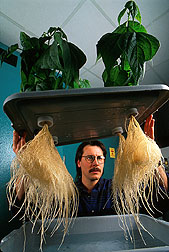This page has been archived and is being provided for reference purposes only. The page is no longer being updated, and therefore, links on the page may be invalid.
|
|
With Green Beans, Less Water Means More CalciumBy Jim De QuattroNovember 17, 1999 Some green beans outdo others as a source of bone-building calcium. The difference, according to researchers, can depend on how much water flows through the plants. When it comes to getting calcium from the diet, most people think first of milk. But green beans are good sources too. Scientists at the Children's Nutrition Research Center in Houston, Texas, compared calcium content in six bean varieties. The top performer, Hystyle, was also the stingiest water user. The Houston center is a joint venture of Baylor College of Medicine and the Agricultural Research Service, USDA's chief scientific agency. The Houston scientists focus on how foods can better nourish children--and new mothers and their babies. Calcium is especially important for children when their bones are growing. Dairy products are excellent calcium sources. Beans and other veggies can also provide a substantial portion of requirements. And these foods could play a bigger role for children who can't tolerate milk sugar. In the Houston study, the Hystyle green beans had about double the calcium content of a variety called Labrador. The reason? Hystyle is better at conserving water, according to plant physiologists Michael Grusak and Kirk Pomper. Water dilutes calcium moving through a bean plant, reducing the amount reaching pods. Tiny pores called stomates open and close to control the speed at which water enters and leaves a plant. This action is genetically and environmentally controlled. Overall transpiration in Hystyle was about half that of Labrador. The lower transpiration meant higher calcium concentrations in Hystyle's xylem stream. The xylem transports liquid and mineral nutrients from roots to shoots, somewhat as a person's arteries carry oxygen-rich blood. A story about the research appears in the November issue of Agricultural Research magazine and on the web at: /is/AR/archive/nov99/beans1199.htm Scientific contact: Michael A. Grusak, ARS Children's Nutrition Research Center, Baylor College of Medicine, Houston, Texas, phone (713) 798-7044, fax (713) 798- 7078, mgrusak@bcm.tmc.edu. |

